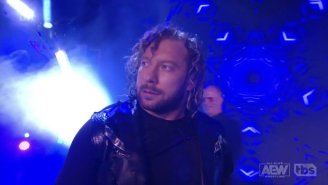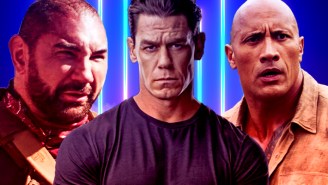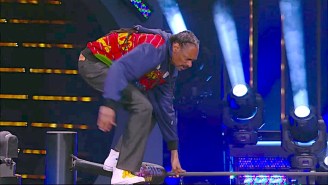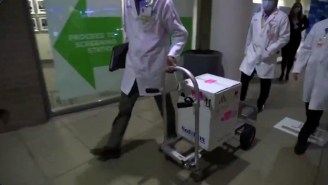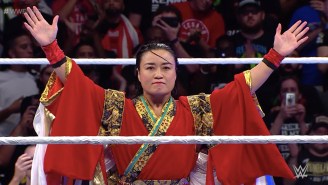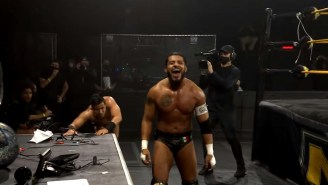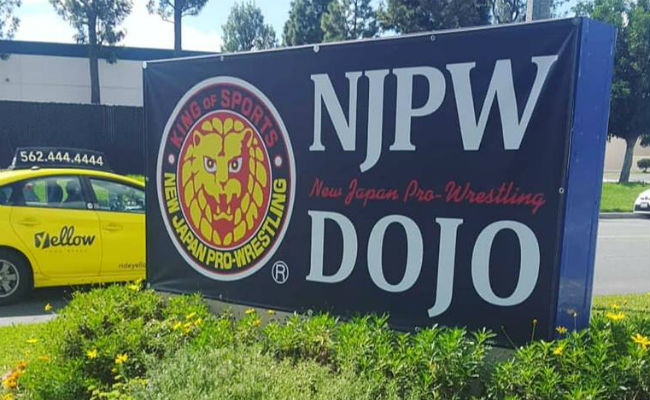
New Japan Pro Wrestling, the largest professional wrestling promotion in Japan and second largest in the world, is in an expansion phase. They’ve been getting more popular outside of Japan for the past few years, and have responded by touring Australia for the first time, booking legends like Chris Jericho and Rey Mysterio known primarily for their work outside of Japan, making their streaming service, NJPW World, more accessible for English-speaking users, and more.
This past weekend was a big one for their U.S. expansion, with the grand opening of their new L.A. dojo on March 24, and the sold-out Strong Style Evolved show on the 25th.
Brandon Stroud and I had the opportunity to do press at both events through AXS TV, the channel that airs New Japan shows in the U.S. and did the live broadcast of Strong Style Evolved. We got to talk, in and out of kayfabe, to some major New Japan talent, and enjoy some really cool events.
Students from the dojo’s first weeklong camp (which took place the week before the grand opening) staffed the event along with actual Tokyo dojo Young Lions Shota Umino and Ren Narita (and yes, I did feel a sense of accomplishment about being able to identify individual YLs on sight.) Many of the American students had years of wrestling experience. Some had trained with Brian Kendrick, tried out for WWE, and/or wrestled for promotions including PCW Ultra, Championship Wrestling from Hollywood, Joey Ryan‘s infamous Bar Wrestling, and Kendrick’s Wrestling Pro Wrestling.
Everyone we talked to said the New Japan dojo camp was one of the hardest things they’d ever done.
The Press Conferences
The first press event was a contract signing/press conference for the upcoming IWGP United States Championship match between Switchblade Jay White (c) and Hangman Page at Strong Style Evolved. We got a surprisingly good promo from Page, then an absolutely destructive one from White. We should all start saying “Hangman” in a New Zealand accent too.
An interesting thing about this contract signing is that is was witnessed (as in, he signed the match contract as a legal witness) by a man who I have no reason to believe wasn’t the shoot president of LEC Sponges, one of NJPW’s sponsor companies. LEC also had a merch table at the dojo that sold 1) sponges with Okada on the wrapper 2) sponges without Okada on the wrapper. If you bought both, you also got a page of amazing stickers of either Okada or Tanahashi. I got the Tanahashi ones.
https://twitter.com/MrBrandonStroud/status/977674092043104256
That kayfabe press conference was followed by a shoot one about the opening of the L.A. dojo. Jushin Thunder Liger, Katsuyori Shibata, David Finlay, Juice Robinson, Ryusuke Taguchi, dojo assistant coach Scorpio Sky, and Hiroshi Tanahashi (who entered through the crowd, high fived everyone, and did his full Ace pose on the ropes before taking his seat at the panel) answered questions about NJPW’s expansion and what the dojo means to them.
Shibata said he’ll be looking for “samurai” and people with the right spirit in the dojo. Juice mentioned how much more positive his experience in the Tokyo dojo was compared to his experience with NXT, but unfortunately we didn’t get to follow up with him about this later.
The panel was followed by Kagami Biraki, a traditional sake barrel breaking ceremony to officially open the dojo. The wrestlers, Tiger Hattori, and the president of LEC Sponges, gathered around two sake barrels and hit them three times in unison with mallets. Shibata’s mallet broke when striking the drum, which was very appropriate for even a recovering-from-brain-injury Shibata.
After the ceremony, we joined the rest of the media types in scrum interviewing some of the talent (Shibata, Tanahashi, Page, and White) about the dojo, New Japan’s future, hair care, and more. Shibata and Tanahashi’s answers, except when noted, were in Japanese and relayed to us through a translator. Below are excerpts from those interviews.
Katsuyori Shibata
Emily Pratt: What do you think of American pro wrestling? Are there any things from American pro wrestling you want to teach your students to change?
Katsuyori Shibata: This is the L.A. Dojo, and a dojo is not a Performance Center. So I will teach American wrestlers to learn the history and tradition of Japanese pro wrestling. I think that this is my mission to teach them … I think that’s going to change everything.
Shibata also said that he “likes Los Angeles so much already,” especially because of the blue skies and that fact that it has less noise than Tokyo, which should help him focus on teaching. (Please don’t move to L.A. expecting less noise if you’re coming from almost anywhere else though.)
Shibata on the diversity of the talent training in the dojo: I think L.A. is borderless. There’s going to be a lot of people from all over. And I think having border or boundary … that kind of age is over. The color of eyes, skin, nothing matters. What matters is your spirit and your heart.
On the transition from wrestler to teacher: At the moment, I am still acting as a pro wrestler. I haven’t retired yet, and I am recovering from my injury. While I was recovering from injury, I found out there was going to be an L.A. dojo. I thought the best idea would be to move here to L.A. and sweat together with the young upcoming talent and recover myself, then come back to the ring.
On his recovery: I still don’t know. I don’t know when I can recover and practice again … Because I don’t want to stop, and I’m actually unstoppable. When I was staying in Japan, that’s such a small country, I was hearing a lot of things about myself and I get rumors. When we hear all that negativity, I became so depressed. I didn’t want to stay myself like that, so I came over to L.A.. And once I came here, as I said, the climate is so good, always skies are blue, and I think that this facility we have in L.A. that makes me very comfortable, and I am feeling very grateful… I still have a number of limitations, but there’s a number of things that I can do right now, since I came to L.A., as I keep recovering and keep training.
Shibata’s intensity when talking about his possible return to the ring reminded me of Daniel Bryan, who, maybe you’ve heard by now, was recently cleared to return to in-ring action after two years of retirement. Shibata was forced away from the ring after a subdural hematoma that required emergency surgery. The bout, an IWGP Heavyweight Championship defense by Okada at last year’s Sakura Genesis, happens to be NJPW’s current free match of the week, and you can watch it in its entirety here. Hopefully it won’t turn out to be the wrestler’s last.
Hiroshi Tanahashi
Hiroshi Tanahashi on NJPW’s growing popularity in the U.S.: I think the reason for New Japan’s growing popularity over the past two-three years is that New Japan style is original style … especially the existence of Tanahashi.
Brandon Stroud: Tanahashi, what do you use to keep your hair looking so good?
Tanahashi, in English: Nice question, good question. At first, after shower, towel dry and hair cream and hair oil. Then dryer and hair iron.
Brandon Stroud: Very nice. Do you use any kind of conditioner or anything?
Hiroshi Tanahashi: I use [consults translator in Japanese] … hair growing serum.
Brandon Stroud: What does a young wrestler have to do to be the next Tanahashi?
Hiroshi Tanahashi: At first, long hair. Work out hard, get a beauty body. Most important thing, never tired.
On his cardio routine, in response to Dave Meltzer: 30 minutes to 60 minutes cardio. Heart rate, 120 to 140 … I love step machine because [it’s easier on his knees.]
Dave is nearing Matt Jackson levels with those arms… pic.twitter.com/EKBUs87mS3
— Cody Rhodes (@CodyRhodes) March 24, 2018
Tanahashi on his bicep tear: [flexes and shows surgery scar] I got peak … new peak. Looks good.
After the interview, Tanahashi told us, “I’m studying English conversation.” We all told him he was doing well (he was!), and he added, “During cardio, 30 minutes, I listen to English conversation podcast. Next time, I speak English myself … “
Please speculate about whether or not this means we might see Tanahashi in WWE soon, hopefully to cut a blistering promo on and then defeat his American counterpart, John Cena, and do a triple encore victory air guitar performance.
Hangman Page
Emily Pratt: Is Bullet Club fine?
Hangman Page: Bullet Club is fine. Look, we’re a group of the best wrestlers in the world. Legitimately, the whole group. And when you have guys like that together, working together all the time … we all have egos, and those egos clash from time to time. But we’re all friends, you know what I mean? And I think over time that’s going to prevail.
We’re going to have this match tomorrow with Kenny and Ibushi against the Bucks. Kenny and Cody, they’ll do their thing and it’ll be done … I’m not sure that it matters as much what happens other than that it happens. We get it out and we get it done. I’ll be glad when it’s done. I think after Supercard … we’re back, we’ll be fine.
Page, in response to Brandon’s question about how he thinks Being The Elite has changed wrestling storytelling: There’s so much wrestling. I mean, if you spent 24 hours a day … watching wrestling nonstop you probably still couldn’t see all of it that’s out there. Being The Elite is once a week, 10-15 minutes, it’s easy to digest. It’s fun, it’s funny, it’s engaging, it can be serious too. And I think people have latched on to that in some way, you know what I mean? And it’s just us hanging out, just joking around… and people relate to that… It’s hard on a television program to get your true and real personality out there. With Being The Elite it’s just us with our phones sticking them up and saying “What if you said this? This would be funny.” It think people appreciate that … it’s helped a lot.
Page’s personal thoughts about the dojo: I’m excited for this. I wish this was a thing when I was coming up in wrestling. It would have been something I would have jumped on immediately. This is huge… I don’t know how permanent of a fixture… the dojo here will be, but I’m excited to find out what the plan … this could be huge … there are a lot of American guys going over to New Japan, and that gives them a base here… It’s a great place too. The facility’s awesome.
Brandon Stroud: You mentioned Bar Wrestling … Do you have any deeper opinions on Joey Ryan’s penis after your confrontation?
Hangman Page: Look, man, this thing’s been going for a long time. He was, for years – like, for years! I don’t know how he managed to do this and nobody called him out on it – for years he was paying guys to grab his junk and pretend like it flipped them. For years he got away with that. I was the only person who saw through it out of all of wrestling, every wrestler, every wrestling fan, every wrestling critic … I saw through it. I called him out on it, and I was right! … Maybe that put some pressure on him to maybe learn how to do this for real … At Bar Wrestling, what I thought would happen was not what happened. And good for Joey. I don’t think that’s the end of the story.
Jay White
Emily Pratt: What does it mean for you as an international talent to defend the United States Championship in the United States?
Jay White: It’s quite interesting that there’s been two United States Champions; neither one of them has been from the United States. Kenny – Canadian, and myself from New Zealand. It’s an odd feeling, and Page is talking about wanting to take this and do it the American way. It would be fitting for his story to do it on American soil. But it’s going to make it that much sweeter when I beat him tomorrow and keep this United States Championship in America, belonging to a New Zealander, working for a Japanese company.
White on training in the NJPW dojo: I find the difference between guys that start in the dojo, Japanese guys, and someone like myself or David Finlay – I’d wrestled for two years before I got to New Japan, same with Finlay – having that outside experience, it’s priceless for me, it’s so important. I think a lot of the Japanese guys, when they’re brought up through the dojo, that’s all they know about wrestling is what they’re being taught right then and there. Whereas you’re just a little bit more ahead of the pack … I find it’s a bit of an advantage coming through the dojo if you have experience elsewhere.
Brandon Stroud: What’s the different between Jay White and Switchblade? What makes you Switchblade?
Jay White: What makes me Switchblade … I play with knives, basically. I carved my first pumpkin in my life last year, so maybe that had something to do with it. It’s just more of a carefree attitude. Coming up through the dojo, guys like Finlay and Juice would laugh at me – not seriously, but about always making sure I was doing the right thing, not stepping out of line or anything, kind of following Japanese culture and doing what the Japanese boys do. You know, in New Japan they go a little bit easier on the foreign Young Boys, but I didn’t want that path at all. I wanted to do what the Japanese guys were doing. You know, very much doing what I was told. But now it’s just taking opportunities, while creating them as well… just not caring too much about what people are telling me to do. It’s about what I want to do now. Making my own path.
Switchblade on returning from ROH to wrestle Tanhashi at Wrestle Kingdom 12: Yeah, that’s a big jump … you look back at a year ago from this time, people wouldn’t know who I am or what I was doing. I wasn’t doing anything noteable. You fast forward to now, and I’m holding this. I beat Kenny, and in this big match tomorrow as well. It’s always a whirlwind, and you need to take those moments… to kind of take a step back and think, “Oh sh*t, I’m actually here right now.” So that’s always a nice and gratifying feeling.
Emily Pratt: You said when you were training in the New Japan dojo in Japan they went a little bit softer on the foreign students. Do you think that people at the L.A. dojo might not get as hardcore training as people in Japan?
Jay White: They’re not going to get it as hard. Trust me, they’re going to get hard training, but they’re not going to be … you know, in the Japanese dojo in Japan, at their home… you’re not going to have the older senpai coming through as much as you do there … they might decide to put you through some sort of training, and it’s entirely up to them. And having the other Japanese Young Boys around you, they’re going to be a lot harder on them as well, so they probably will be a bit more lenient on guys here. But don’t get it twisted, they will still push the guys here. Maybe because I said that they’ll push them even harder now, who knows. I might have just screwed everyone over.
The Rest Of The Grand Opening
After the interviews, we saw three wrestling matches. David Finlay and Juice Robinson defeated Bateman and Brody King, Rocky Romero defeated Scorpio Sky, and Roppongi 3K defeated Kushida and Uptown Andy Brown. As you can see from those results, the more New Japan you are, the better wrestler/team you are! So if you want to be a good pro wrestler, you should obviously train with New Japan!
The NJPW L.A. dojo opening was a really cool, educational experience. Hangman didn’t flip a table like I hoped he would, but I got those Tanahashi stickers, so it all evens out. I’m now even more interested in seeing where this company goes with training wrestlers and expanding their presence in America.

